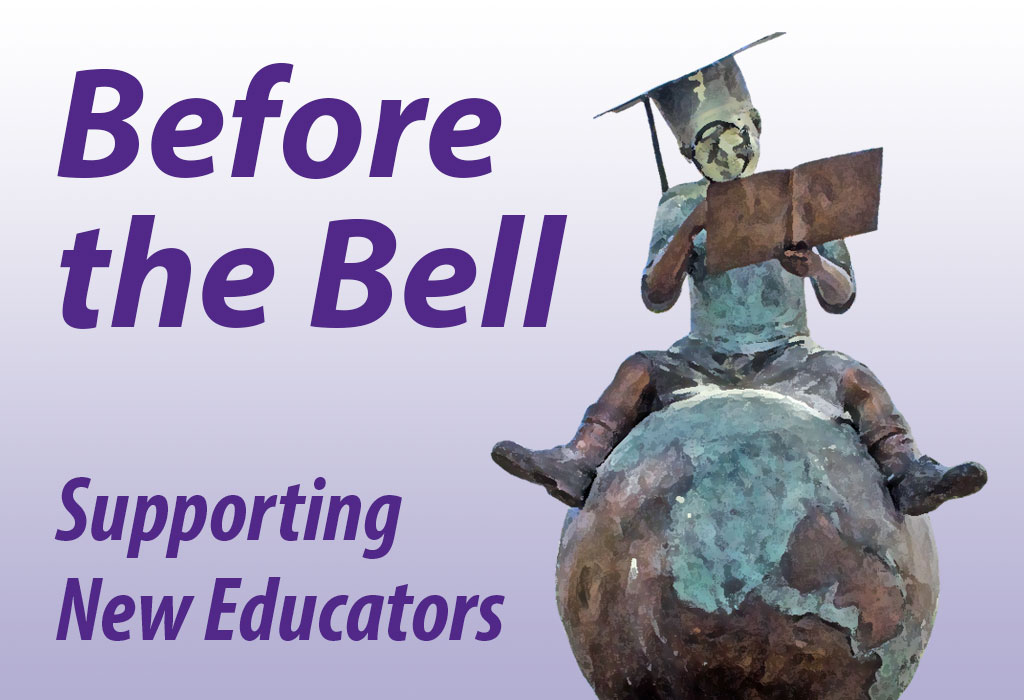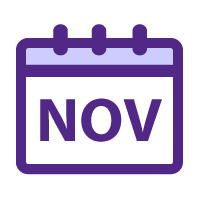Lori Goodson, Editor
Mary Hammel, Technical Editor
Category: October 2014
Fall Traditions
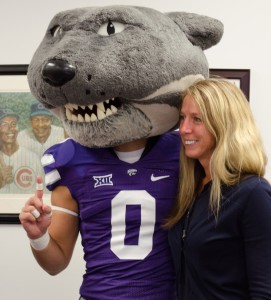
As we move into fall, your calendar is probably becoming dotted with all sorts of traditions such as the first football game, homecoming, fall carnival, volleyball, band performances, and school picture day!
It doesn’t matter if you’re teaching elementary, middle school, or high school—each level has its own unique traditions to observe.
We encourage you to enjoy those events—participate in or attend as many as possible! It gives your students a chance to see you in a different light—and you get to understand your students’ interests and abilities away from your classroom.
While all those activities are great and add character to your school, don’t forget to come back to Manhattan for some purple events that are traditions on our campus!
KSU’s Homecoming runs October 19 through 25, with the theme “Coast to Coast.” Among the events is the annual Homecoming Philanthropy 5K Run/Walk on October 19 to benefit the Special Olympics Kansas. The homecoming parade starts at 5 p.m. October 24, followed by a pep rally.
Check out all the homecoming details at http://www.k-state.com/s/1173/newsletterSocial.aspx?sid=1173&gid=1&pgid=5006. We hope to see you dressed in purple and back on campus for a Homecoming visit!
Other Duties Offer More Opportunities to Connect
 Outside your classroom, you’ll find that you’re asked, or possibly required, to take on other duties around your school. Some of the more common tasks: bus duty (before and/or after school), gym supervision (before and/or after school), lunch supervision, and recess. Plus there are all the club sponsorships available at the various grade levels.
Outside your classroom, you’ll find that you’re asked, or possibly required, to take on other duties around your school. Some of the more common tasks: bus duty (before and/or after school), gym supervision (before and/or after school), lunch supervision, and recess. Plus there are all the club sponsorships available at the various grade levels.
Before you say no—or at least grumble a little about it—look at the opportunities these extra duties provide.
At the middle level, you might find yourself supervising bus duty; that can give you a chance to hang around the elementary students as they leap off the last step on the bus, headed home after a busy day. You may end up tying a very small shoe now and then or helping adjust a tiny mitten in the wintertime, but you’ll also flash back to your own elementary school days…and remember just where your own students came from not so many years ago.
At the elementary level, you may get to see some of your students bounce into their parents’ arms at the end of the school day—bubbling about what they did in your class today.
At the high school, the bubbling may be minimal, but you’ll be in a more relaxed atmosphere as your students climb into their cars and head out for the day.
Lunch duty can provide an opportunity for you to mingle with the student body—some students you may not even have in class. It’ll give you a chance to visit with them—about food, interests, and…yes…even school-related matters.
All of these opportunities can be powerful relationship builders for you and your students, especially when you’re a new teacher trying to make connections and get comfortable in the environment.
Make the most of them.
Healthy Habits for Cold/Flu Season
 Falling leaves and doorsteps decorated by bright orange pumpkins signal—among other things—that the cold and flu season has arrived!
Falling leaves and doorsteps decorated by bright orange pumpkins signal—among other things—that the cold and flu season has arrived!
Since you may find yourself surrounded by sneezes in your classroom at some point in the next few weeks, take some steps to protect yourself from germs—and keep yourself from missing a few days of school. Try to:
- Get a flu shot to limit your chances of getting sick.
- Drink plenty of water.
- Eat healthy foods.
- Wash your hands regularly.
- Get eight hours of sleep (even if that means that last set of papers has to be graded the next day).
New USD 475 Teachers Share Their Experiences

8th grade Language Arts
Junction City Middle School
“I enjoy working for USD 475 because of our district’s commitment to success. It has been a pleasure to work for a district that places such a high value on equipping me as a teacher to promote student success within my classroom.”

10th/11th Language Arts
Larry Dixon Center for Innovative Studies
(part of Junction City High School)
“Thus far I’ve really enjoyed the exciting and welcoming environment provided by the teachers and the administration of the district. I know that whenever I have questions that there is someone right around the corner that I can ask for help. One thing that I’ve learned so far is consistency. You have to be consistent in what you do, whether it be procedures, rules, or class structure. I feel like the learning environment provided is far more open and safe when all students know what to expect and things aren’t changing all the time.”
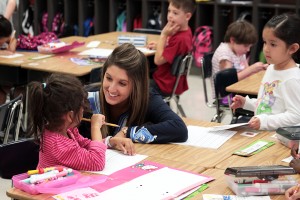
1st grade teacher
Seitz Elementary
“USD 475 is such a supportive district in all aspects, from my colleagues to professional development and technology. I feel very taken care of, which is important for a first-year teacher! A word of advice for new teachers would be to never assume that your students know how to do something! Make sure you take the time to explain procedures and classroom supplies extensively so you and your students are not frustrated by mismatching expectations.”
Review, Reflect, Revise, Restart
 As you move through your first quarter of the school year, it’s time to reflect—upon all things education. You’ve not only survived your first few weeks of teaching; you’ve thrived!(Well, most of the time, anyway.)
As you move through your first quarter of the school year, it’s time to reflect—upon all things education. You’ve not only survived your first few weeks of teaching; you’ve thrived!(Well, most of the time, anyway.)
You’re getting settled into your new role as teacher, so it’s time to look back at how your year started—and figure out how to fix some of those mistakes you made in your first week of school. (We’re speaking from experience on this one!) Are there student behavior issues you need to address? Did you get started off on the wrong foot with a student or two? Maybe a parent? And what about those lessons that didn’t go as well as you’d have liked? We’ve all been there, and we always have changes that need to be made. Now is an excellent time to regroup!
We’ve all been encouraged to reflect on our teaching, but it’s hard to find the time to do it. Here are some quick ways to help you improve in the upcoming weeks.
- Keep a journal or a spiral notebook in an easy-to-grab place in your desk. At the end of each school day, make a note of things that went well and others that need to be modified.
- Mark up your lesson plans! Scribble quick notes about changes and additions you’d like to make before “next time.”
- Determine some of the missteps you made with your students and/or parents, and decide how best to clean that slate. To use a theater student’s approach, “End scene.” Move on; start new with your students. Even your most frustrating students deserve a fresh start. Offer them that opportunity; they may surprise you.
- Send a brief note…or an elaborate newsletter, if you’d like…home to your students’ families. You may have been too busy at the beginning of the year, but now is a great time to say hello again and point out some of your goals for the rest of the year. Be sure to thank them for their support and offer one or two ways that they can help their child make the most of the school year.
Common Mistakes New Teachers Often Make
 From time to time, we’ll offer some ideas and reflections—some serious, some…well, not so much…addressing a variety of topics from several of the Curriculum and Instruction professors who led your classes at the College of Education. You may have graduated, but they’re still available to offer support, in the form of resources and humor! For this issue, we asked about common mistakes new teachers often make. Here’s what a few had to say:
From time to time, we’ll offer some ideas and reflections—some serious, some…well, not so much…addressing a variety of topics from several of the Curriculum and Instruction professors who led your classes at the College of Education. You may have graduated, but they’re still available to offer support, in the form of resources and humor! For this issue, we asked about common mistakes new teachers often make. Here’s what a few had to say:
- Dr. Brad Burenheide (Secondary Social Studies)— “Trying to do it all at once. Develop a plan of attack and knock it out one bit at a time.”
- Dr. Tom Vontz (Elementary Social Studies)— “Paranoia and anxiety. Teaching is a performing art. Our craft is on public display for students, parents, administrators, and other teachers. As such, it is easy for a new teacher to become defensive, anxious, and even a little paranoid. Fundamentally, however, it is important to remember that everyone really wants you to succeed and that you do not need to be perfect to be successful.”
- Dr. Sherri Martinie (Secondary Math)— “They don’t set clear expectations, guidelines, and procedures. Avoid this by being specific about how you want your students to behave in the classroom and then stating this clearly and reinforcing this.”
- Dr. Vicki Sherbert (Secondary English/Language Arts, Speech/Theatre, Journalism)— “We often think we can tackle too many new things at once. When we do that, our students feel scattered, and so do we. Remember to choose one new idea or practice to implement at a time.”
- Dr. Phillip Payne (Music Education) — “One mistake I made as a new teacher was getting excited over my first paycheck! Don’t let the number go to your head. Enjoy having funds and a steady paycheck, but be frugal in those first months to avoid any financial hardships down the road.”
Set Your Own Path for Professional Development
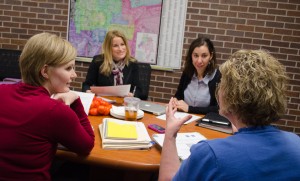 During these first few weeks of teaching, amid several other forms, you’ve probably been asked to turn in your own professional development plans for the 2014-15 year. Chances are, though, your focus is on those day-to-day tasks.
During these first few weeks of teaching, amid several other forms, you’ve probably been asked to turn in your own professional development plans for the 2014-15 year. Chances are, though, your focus is on those day-to-day tasks.
I know. You just finished your college degree. But, it’s important that you continue to learn throughout your journey as a teacher.
Your district and school will probably be providing a variety of professional development opportunities for you…in the form of speakers and workshops during in-service days. When the students clear out of the building, it’s time for you to learn.
While districts usually have a significant portion of their budgets set aside for professional development, they’re also limited—budget, time, and content constraints—as they try to provide learning opportunities for such a variety of faculty needs.
It’s really important that you take a little time to plan what you’d like to and need to learn through the year—including over the summer (which will be here sooner than you think!). It’s a great way to figure out what would help you improve as a teacher.
“Attend at least one professional development event every summer,” recommends Dr. Tom Vontz, Elementary Social Studies. “Most are free and many are interesting. Stay connected, my friends.”
So here are some possibilities to make sure you take care of yourself as a “student” of teaching—all designed to help increase your students’ learning by making you a better teacher:
- Meet with your administrator, department chair, mentor, or a veteran colleague for a conversation about your professional development needs. Determine areas you need to strengthen in your knowledge and teaching skills, whether that’s implementing the new Common Core standards, developing content-specific approaches, or using the latest in technology.
- State organizations are a great way to start getting involved, and some are free to join…or offer free or discounted membership for new teachers; be sure to ask! Consider joining these:
- Literacy: Kansas Reading Association (all grade levels)
http://www.kansasread.org/join.html - Math (elementary and secondary): Kansas Association of Teachers of Mathematics
http://www.katm.org/baker/pages/membership.php - English/Language Arts (secondary): Kansas Association of Teachers of English
http://www.kansasenglish.org/memberships - Social Studies: Kansas Council for the Social Studies
http://www.kcss.info/node/6 - Social Studies: Kansas Council of History Education
http://www.ksche.org - Science: Kansas Association of Teachers of Science
http://kats.org/membership-2/ - Music: Kansas Music Educators Association (all grade levels)
http://www.ksmea.org/membership/
- Literacy: Kansas Reading Association (all grade levels)
- Scout around for affordable conferences or workshops that fit into your professional development plans. Target a specific area that you want to address and look for opportunities to learn more about that topic.
- As you work toward renewing your teacher license, consider taking a graduate class. http://coe.k-state.edu/grad/index.html
- Do the reading! Find a journal (possibly from one of the state or national organizations in your content area or grade level). Budget tight? Then check with your building librarian/district curriculum director.
- Find other valuable resources—for lesson plan ideas, webinars, etc., such as ReadWriteThink.org, a website supported by the International Reading Association and the National Council of Teachers of English: http://www.readwritethink.org
- The National Council for Literacy Education focuses on literacy at all grade levels and in all content areas. Visit their Literacy in Learning Exchange (http://www.literacyinlearningexchange.org/home) and sign up for their NCLE SmartBriefs (https://www2.smartbrief.com/ncle/index.jsp?utm_source=brief), which provides literacy-related news for educators, administrators, and education advocates.
We Want to Hear From You
![]() Do you have a question about classroom procedures? Or a suggestion for a topic we should address in Before the Bell? Want to add your name to our mailing list? Or provide a different email for our mailing list? We’d love to hear from you, so please email us at lagoodson@k-state.edu.
Do you have a question about classroom procedures? Or a suggestion for a topic we should address in Before the Bell? Want to add your name to our mailing list? Or provide a different email for our mailing list? We’d love to hear from you, so please email us at lagoodson@k-state.edu.
Go, COE Cats!
Picture Perfect
Many KSU College of Education graduates have their own classrooms for the first time this fall. Here are a few who have just started their teaching careers. Be sure to send us your photo so we can include you in an upcoming issue!

Fifth-grade Teacher
Woodrow Wilson Elementary
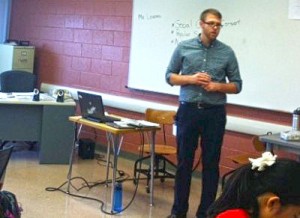
Social Studies Teacher
Manhattan High School
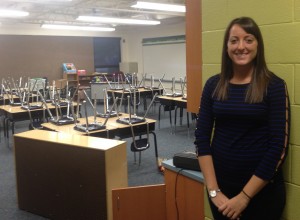
Third-grade Teacher
Ogden Elementary School
Looking Ahead….
Next month, we’ll share classroom suggestions and teaching ideas as you head into the winter months. Be sure to read next month’s issue for:
- Great online classroom resources from some of your favorite faculty members
- How to celebrate holidays AND value diversity
- When your principal visits your classroom (evaluations and beyond)
- Suggestions for semester-ending activities
- Faculty meetings
- Faculty share their votes for best…and worst…school lunches
Our Curriculum and Instruction faculty want to remind you of the following:
- From Dr. Brad Burenheide: The 9th Annual Social Studies Symposium is scheduled for February 7, 2015.
- From Dr. Phillip Payne: New Music Teacher Day will be held October 24.
